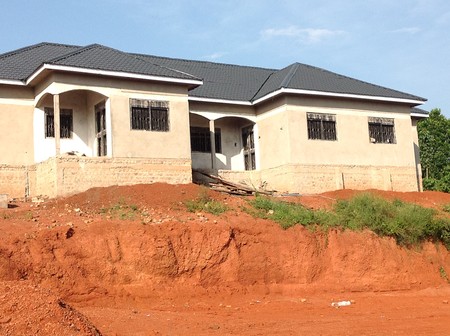
100% of donations to
the projects.
break free of
aid dependency.

The association Another Hope looks after street children and orphans in Uganda. With an orphanage and a guest house they establish for them a permanent gateway to a brighter future. Independently, lovingly, and strategically.
The situation: Uganda has been hit hard by several crises. Dictatorships, the war with the neighboring country Tanzania, and recurring civil unrests have for decades been hampering the political and economic development of the East-African country. Over one third of the population live below the poverty line, having at their disposal less than $1.25 per day. The ramifications are hunger and destitution; every sixth child is malnourished.
Moreover, HIV has has wreaked havoc on the people. Though the infection rate has sharply declined during the recent years, from fifteen to seven percent, the struggle is far from over: The deaths of many infected adults have left an estimated two million orphaned children. They are known as the “lost generation,” growing up with no one to care for them and no one covering for their schooling and medical care.
The project: The organization Another Hope Children’s Ministries (AHCM) wants to permanently support the children in Uganda—intellectually and physically. Thus, Another Hope has established the Safe Project near the capital of Kampala. It is a rooming house for children where they are cared for and educated.
Currently, however, Another hope has to rent the accommodation, so that much money has to be expended for the monthly payments. Hence, the organization wants to build their own house, so they can accommodate a greater number of children, save costs, and also use the property for a guest house, to ensure long-term financial security for the project.
The goal: Another Hope intends to accommodate at least fifty street children from poor or HIV/AIDS-stricken families on the property—in cooperation with their parents or legal guardians. The premises and some materials have already been acquired. Now the new orphanage building and the guest house have to be erected. The returns from the guest house business are to permanently cover the costs for care, housing, and education of the children as well as the running costs of the project—an investment into an independent future. Also, Another Hope intends to rely on local suppliers for their housing project, thus stimulating the local economy. (Plans to run a chicken farm were frustrated by economic changes in the country and had to be adapted.)
The current situation: As detailed in our April 2013 report, the new orphanage building is almost finished but several problems have interfered with the final phases of the work. Contrary to announcements from 2010, the government has still not extended the electricity grid to the region, so that the orphanage requires solar energy; the construction company informed Another Hope that owed to the position of the orphanage on a hill, the foundation had to be laid deeper than originally planned; the company also admitted that their original cost forecast had been low, for one because they forgot several items but also because they had based it on the lower raw material prices in their own district rather than the ones for Kampala; finally, anticipated risks, which by themselves would’ve been covered by the security margin, added to the shortage of funds.
Obviously, Another Hope has learned from these problems, first of all by basing the estimates for their guest house project on a layout with proper foundation. They will also press for a contractual limitation of their liability for miscalculations by the construction company. We at Your Siblings, furthermore, acknowledged that our initial system that provisioned a blanket 10% security over all needs was not flexible enough to anticipate contingencies like these. For this and future projects we thus use a new system with individual risk estimates per need that are averaged over the batch.
The needs that comprise this project are the bare minimum that is now still necessary to allow the children to move to their new home. Among them you’ll find wall paints, interior fixtures, and, importantly, the solar installation.
How does the Safe Project fulfill the Your Siblings criteria?
Sustainability: By building a house on the already-acquired property, the project would no longer have to pay rent. Thus, they can spend the money on support for the children. Moreover, the returns from the guest house permanently ensure their education, upbringing, and care, and thus their chance to actively and meaningfully contribute to society in the future.
Transparency: The project can be visited at any time. You can view the accounting data at Another Hope in Kampala as well as at the Your Siblings office in Berlin.
Nonprofit: Another Hope has no commercial ambitions and is independent of the Ugandan government.
Local roots: Another Hope was founded and is headed by Ruth Nambowa. She was born in Uganda and continues to live there.
Urgency: The conditions in which street children an orphans live in Uganda are conditions of hunger, disease, forlornness, and crime. This project provides a new home to thirty more children right away.
Help Another Hope to permanently support the children of Uganda and to realize the vision of the Safe Project!







